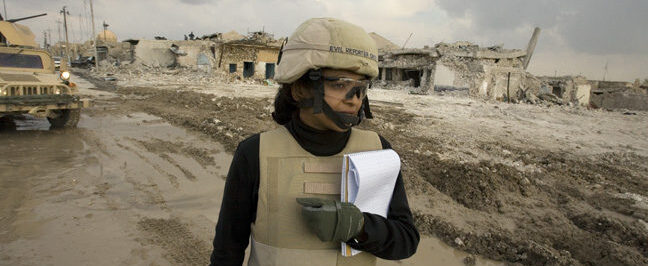E-Book. Published by Agate Books, 2012
 Here is what Agate said about “Chaplain Turner’s War:” The U.S. mission in Iraq ended Dec. 18, 2011, as the last American soldiers climbed into trucks and headed south through the desert towards Kuwait. Nearly 4,500 American troops died in the Iraq war. More than 30,000 others were physically wounded. Countless others live with scars that can’t be seen. While medics and doctors heal the physical scars of the wounded, the military employs a select few to heal the hearts, minds, and souls of soldiers–all of whom are changed forever by war. In January 2008, Atlanta Journal-Constitution international reporter Moni Basu began documenting life at war with Darren Turner, a chaplain in the U.S. Army. Chaplain Turner served as the emotional support system of U.S. soldiers more accustomed to toughing it out than opening up.
Here is what Agate said about “Chaplain Turner’s War:” The U.S. mission in Iraq ended Dec. 18, 2011, as the last American soldiers climbed into trucks and headed south through the desert towards Kuwait. Nearly 4,500 American troops died in the Iraq war. More than 30,000 others were physically wounded. Countless others live with scars that can’t be seen. While medics and doctors heal the physical scars of the wounded, the military employs a select few to heal the hearts, minds, and souls of soldiers–all of whom are changed forever by war. In January 2008, Atlanta Journal-Constitution international reporter Moni Basu began documenting life at war with Darren Turner, a chaplain in the U.S. Army. Chaplain Turner served as the emotional support system of U.S. soldiers more accustomed to toughing it out than opening up.
Despite a rough and tumble youth, Chaplain Turner found spirituality and made the decision to practice faith amid a flock of the suffering. For that reason, he chose to be an Army chaplain on the front lines of The Iraq War. But Chaplain Turner’s war would unfold on many fronts: as a soldier on the battlefield, as a counselor behind closed doors, as a minister at the altar, as a friend, as a father. He would become the backbone of an infantry battalion on its third deployment in Iraq. As the sole chaplain for a thousand men and women, he would absorb all that befell them. He would share in absolute joy–and tragedy.
Ms. Basu captures the entire range of these emotions in this book based on her time covering Chaplain Turner in Iraq and at home. In a series of articles she published in the Atlanta Journal-Constitution and expanded upon here, Ms. Basu deftly depicts the emotional weight carried by soldiers in the field, veterans at home, and a man charged with the harrowing responsibility of being a salve to their scarred souls.
For the first-time ever, the entire series of Ms. Basu’s articles on Chaplain Turner have been collected into one book. There have been few looks into one of this nation’s most controversial wars that have been as honest, heartbreaking, and inspiring as Chaplain Turner’s War. The experiences of the young men and women Chaplain Turner served speak with a clarity and force that is relatable to readers of any religion and of any opinion about The Iraq War. It is a story of people’s lives who are so often taken for granted as steely warriors, and so rarely appreciated as heroes returning home with a lifetime of emotional weight. Chaplain Turner’s War is a must-read for anyone interested in the end of The Iraq War and the perspective of it from those most directly involved.
Review
AWARDS AND PRAISE FOR MONI BASU’S COVERAGE OF CHAPLAIN TURNER AND THE IRAQ WAR:

“[The Chaplain Turner series] had credibility and authenticity because the writer, in the best tradition of unblinking reporting, told her readers what she witnessed firsthand.” — Religion Reporter of the Year, 2009, the Religion Newswriters Association’s recognition for excellence in enterprise reporting and versatility.
“[Chaplain Turner’s War is] a vivid, touching entry about the many-faceted role of religion in an ungodly circumstance.” — Supple Award, Religion Writer of the Year, 2009, the Religion Newswriters Association’s recognition for writing skill.
“[Chaplain Turner’s War is] quiet and moving. [Moni Basu’s] portrayal of the burdens of war, both emotional and physical, unfolds through the story of a 35-year-old chaplain and the soldiers of Bravo Company…She reports sensitively on the damage war does to soldiers’ marriages and to their faith, even to the faith of a chaplain.” —Joseph Galloway Award for Distinguished Reporting, 2009, the Military Reporters and Editors’ recognition for the best in military reporting.
“It’s more honest and more human than a lot of books you might read about Americans in Iraq and Afghanistan. …One of the things that I appreciate most about it is that almost the entire book is based on scenes that Basu witnessed personally. She was deeply committed to telling this story and willingly devoted the time it required of her.” — Mike Francis, The Oregonian
Clarion Award, 2009, First prize in newspaper feature reporting from The Association for Women in Communications.
Asian-American Journalists Association, 2009, First prize, print, unlimited subject matter.
South Asian Journalists Association, 2009, Recognized as outstanding story on any subject by a journalist of South Asian origin.
American Association of Sunday Feature Editors, 2009, Second place, narrative feature.
Nieman Foundation for Journalism at Harvard University, 2008, Notable narrative.
